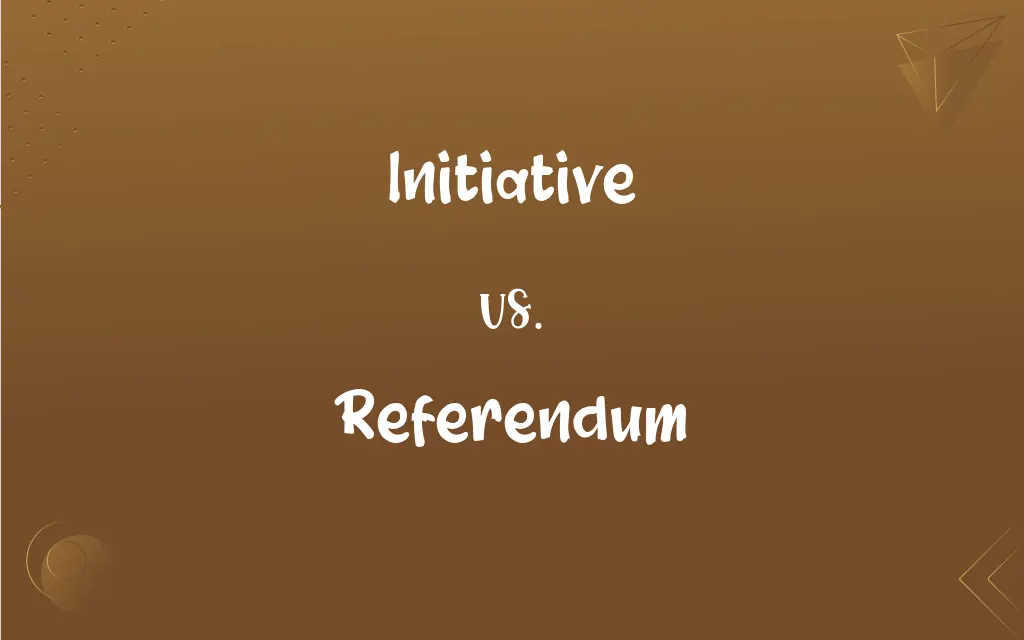Initiative vs. Referendum: What's the Difference?
Edited by Harlon Moss || By Janet White || Published on November 1, 2023
An initiative is a process allowing citizens to propose laws, while a referendum lets citizens approve or reject laws passed by the legislature.

Key Differences
The concepts of Initiative and Referendum both stem from a democratic process, albeit with distinct functionalities. An initiative allows citizens, through petition, to propose new laws or changes to existing ones. This means that if citizens feel there's a need for a specific law or amendment, they can gather signatures in support and push for its inclusion on a ballot.
In contrast, a referendum is a tool that permits the electorate to vote on particular laws or policies that the legislative body has passed. Before becoming law, these proposed legislations are placed on the ballot for public approval or rejection. This ensures that certain decisions, especially impactful ones, get direct input from the citizens.
Initiatives, given their nature, are proactive. They arise from the grassroots level, reflecting citizens' desires or concerns about certain issues. Once the required number of signatures is collected, the proposed law gets a spot on the ballot, awaiting public voting.
Referendums, on the other hand, are reactive. They follow legislative actions, enabling the public to have the final say. It's a check and balance of sorts, ensuring the legislative body's decisions align with the public's will. Both tools, Initiative and Referendum, empower citizens, ensuring their voices are not just heard but also acted upon.
These democratic processes, Initiative and Referendum, bolster the principle of direct democracy. They reinforce the idea that ultimate authority resides with the people, and they have the right to shape the laws and policies that govern them.
ADVERTISEMENT
Comparison Chart
Definition
Process to propose new laws by citizens
Voting process on laws passed by legislature
Nature
Proactive
Reactive
Origination
Arises from citizens
Follows legislative actions
Purpose
Propose new laws or change existing ones
Approve or reject certain legislative decisions
Outcome
Can lead to new laws if approved by voters
Can confirm or nullify legislative actions based on public vote
ADVERTISEMENT
Initiative and Referendum Definitions
Initiative
A quality of being resourceful and determined in facing challenges.
His initiative during the crisis was commendable.
Referendum
A method to approve or disapprove legislation by public vote.
The controversial law was put to a referendum.
Initiative
A strategy or approach started to achieve something.
The mayor took the initiative to clean up the city parks.
Referendum
A process ensuring citizens' direct participation in decision-making.
The country's entry into the union was decided by a referendum.
Initiative
The power or opportunity to take charge before others do.
She showed great initiative in leading the project.
Referendum
A tool for direct democracy.
The city's residents demanded a referendum on the new zoning laws.
Initiative
An introductory step or action.
The workshop was just an initiative to bigger training programs.
Referendum
A public consultation on issues of national importance.
The government promised a referendum on the constitutional changes.
Initiative
The power or ability to begin or to follow through energetically with a plan or task; enterprise and determination.
Referendum
A general vote by the electorate on a single issue.
The state held a referendum on the tax increase proposal.
Initiative
A beginning or introductory step; an opening move
Took the initiative in trying to solve the problem.
Referendum
The submission of a proposed public measure or actual statute to a direct popular vote.
Initiative
The power or right to introduce a new legislative measure.
Referendum
Such a vote.
Initiative
The right and procedure by which citizens can propose a law by petition and ensure its submission to the electorate.
Referendum
A note from a diplomat to the diplomat's government requesting instructions.
Initiative
Of or relating to initiation.
Referendum
(politics) A direct popular vote on a proposed law or constitutional amendment. The adposition on is usually used before the related subject of the vote.
Initiative
Used to initiate; initiatory.
Referendum
An action, choice, etc., which is perceived as passing judgment on another matter.
My father is taking my decision on whether to go to university as a referendum on his performance as a parent, and it's very stressful.
Initiative
Serving to initiate; inceptive; initiatory; introductory; preliminary.
Referendum
A diplomatic agent's note asking for instructions from his government concerning a particular matter or point.
Initiative
In which voter initiatives can be brought to the ballot.
Referendum
The right to approve or reject by popular vote a meassure passed upon by a legislature.
Initiative
A beginning; a first move.
Referendum
The principle or practice of referring measures passed upon by the legislative body to the body of voters, or electorate, for approval or rejection, as in the Swiss cantons (except Freiburg) and in various local governments in the United States, and also in the local option laws, etc.; also, the right to so approve or reject laws, or the vote by which this is done. Referendum is distinguished from the mandate, or instruction of representatives by the people, from direct government by the people, in which they initiate and make the laws by direct action without representation, and from a plebiscite, or popular vote taken on any measure proposed by a person or body having the initiative but not constituting a representative or constituent body.
Initiative
A new development; a fresh approach to something; a new way of dealing with a problem.
Referendum
A legislative act is referred for final approval to a popular vote by the electorate
Initiative
The ability to act first or on one's own.
Initiative
(politics) An issue to be voted on, brought to the ballot by a sufficient number of signatures from among the voting public.
Direct initiative
Initiative
Serving to initiate; inceptive; initiatory; introductory; preliminary.
Initiative
An introductory step or movement; an act which originates or begins.
The undeveloped initiatives of good things to come.
Initiative
The right or power to introduce a new measure or course of action, as in legislation; as, the initiative in respect to revenue bills is in the House of Representatives.
Initiative
The right or procedure by which legislation may be introduced or enacted directly by the people, as in the Swiss Confederation and in many of the States of the United States; - chiefly used with the. The procedure of the initiative is essentially as follows: Upon the filing of a petition signed by a required number or percentage of qualified voters the desired measure must be submitted to a popular vote, and upon receiving the required majority (commonly a majority of those voting on the measure submitted) it becomes a law. In some States of the United States the initiative is only local; in others it is state-wide and includes the making of constitutional amendments.
Initiative
A character trait manifested in a readiness and ability to initiate action; an enterprising spirit; a go-getting attitude; energy; drive; get-up-and-go.
Initiative
In interactive activities, such as conversation or games, the right or opportunity to set the course of action; as, to have the initiative.
Initiative
Readiness to embark on bold new ventures
Initiative
The first of a series of actions;
He memorized all the important chess openings
Initiative
Serving to set in motion;
The magazine's inaugural issue
The initiative phase in the negotiations
An initiatory step toward a treaty
His first (or maiden) speech in Congress
The liner's maiden voyage
Initiative
A process allowing citizens to propose new laws.
The marijuana legalization initiative gained significant support.
FAQs
How does an initiative become law?
If the initiative gains enough support through signatures, it's placed on the ballot and, if approved by voters, becomes law.
Can any law be put up for a referendum?
It depends on the jurisdiction; some matters might be exempt from referendums.
Who can propose an initiative?
Typically, any eligible voter can propose an initiative if they gather the required number of signatures.
Are referendum results binding?
It varies; some referendums are binding, while others are advisory.
Is a referendum a form of direct democracy?
Yes, it allows citizens to directly decide on specific issues or laws.
What's the difference between a citizen initiative and a legislative initiative?
A citizen initiative originates from the public, while a legislative initiative comes from the legislative body.
What's the primary purpose of an initiative?
An initiative allows citizens to propose new laws or changes to existing ones.
Can a decision made by referendum be overturned?
It depends on the jurisdiction and the nature of the referendum, but in some cases, it can be.
Who decides which laws go for a referendum?
Usually, the legislative body decides, but certain matters may automatically go for a referendum based on legal stipulations.
How often can initiatives be proposed?
There's usually no limit, but collecting signatures and meeting other requirements can be challenging.
Do all countries practice referendums?
No, the practice and frequency of referendums vary by country.
Can an initiative be rejected?
Yes, if the voters don't approve it in the ballot.
What challenges face the initiative process?
Challenges might include gathering enough signatures, legal barriers, or opposition from established political entities.
Are referendums always about major national issues?
Not necessarily; they can be on local, state, or national issues, depending on the jurisdiction.
Can referendums be initiated by citizens?
In some jurisdictions, yes, citizens can push for a referendum, often known as a "popular or citizen-initiated referendum."
Are initiatives common in all democracies?
No, the initiative process is specific to certain jurisdictions and not universal in all democracies.
What happens if two conflicting laws are passed in the same referendum?
The specifics vary by jurisdiction, but generally, the one with the most votes or a predefined mechanism will determine the outcome.
Are there costs associated with launching an initiative?
Yes, there can be costs related to gathering signatures, campaigning, and other processes.
How are initiatives and referendums related?
Both are tools of direct democracy, but while initiatives propose laws, referendums approve or reject them.
Who conducts referendums?
Typically, a government or electoral commission conducts referendums.
About Author
Written by
Janet WhiteJanet White has been an esteemed writer and blogger for Difference Wiki. Holding a Master's degree in Science and Medical Journalism from the prestigious Boston University, she has consistently demonstrated her expertise and passion for her field. When she's not immersed in her work, Janet relishes her time exercising, delving into a good book, and cherishing moments with friends and family.
Edited by
Harlon MossHarlon is a seasoned quality moderator and accomplished content writer for Difference Wiki. An alumnus of the prestigious University of California, he earned his degree in Computer Science. Leveraging his academic background, Harlon brings a meticulous and informed perspective to his work, ensuring content accuracy and excellence.






































































